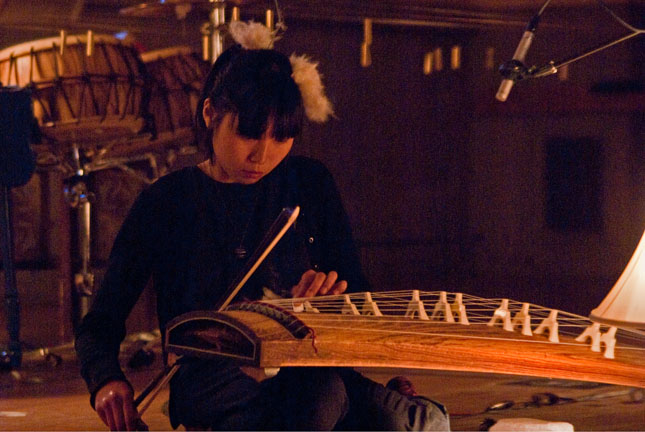Let’s Ask Kanoko Nishi
San Francisco Bay Area composer/performer Kanoko Nishi wraps up our series of interviews with composers who are premiering new works at the 10th Annual Outsound New Music Summit in San Francisco on Friday, July 22nd. The Friday night concert, entitled The Art of Composition, starts at 8 pm at the Community Music Center, 544 Capp Street, San Francisco. Tickets are available online from Brown Paper Tickets, and you can also buy them at the door. Listeners who don’t want to wait that long can get up close and personal with the composers, and learn about their creative process, at a free Monday night panel discussion at 7 pm on July 18th.
 Kanoko is classically trained on piano and received a BA in music performance from Mills College in 2006. Her recent interest has primarily been in performing 20th century and contemporary music on piano and koto, and free improvisation in a variety of contexts. SF Bay Area contrabassist Tony Dryer and guitarist IOIOI, visiting from Italy, will perform Kanoko’s graphic scores as a duo.
Kanoko is classically trained on piano and received a BA in music performance from Mills College in 2006. Her recent interest has primarily been in performing 20th century and contemporary music on piano and koto, and free improvisation in a variety of contexts. SF Bay Area contrabassist Tony Dryer and guitarist IOIOI, visiting from Italy, will perform Kanoko’s graphic scores as a duo.
S21: How has your classical piano training prepared you – or not prepared you – for improvisation and composition?
I think that one very important element that is particular to musical improvisation as opposed to improvisation in other fields is the role of the musical instruments one performs and interacts with, and classical training for me was just a very deep way of building a relationship with my instruments. What has been helpful is not so much the technique, vocabulary or repertoire, but the time, energy and thoughts spent in the process of acquiring these more concrete skills and knowledge. For me, every improvisation I do is like a battle with the instrument I’m playing, in my case, either the piano or koto, and though I cannot really practice improvising by its definition, it’s only by practicing regularly that I feel I can enrich myself as a person, build my stamina and confidence enough to be a suitable match for my instrument to bring out its full potential.
S21: Despite its disappearance from Western classical music training, sometimes improvisation tries to “burst through” all of a player’s mechanisms of control. What do you see as the meaning and inspiration around that?
I’m not so sure that improvisation has disappeared from Western classical music training. It’s certainly not the focus because of many reasons, but any classical musician, whether a composer or a performer, probably also knows and feels that when the actual music happens there is always an element of improvisation, of ideas that are completely beyond one’s conception coming spontaneously, completely out of the blue, which is the ultimate goal for any technical training that one can get. Perhaps to be able to do that is the only meaning in making music at all.
S21: What directions are embedded in your own graphic scores? You’ve shared with me that they go beyond telling the performers to generate sounds.
The score itself indicates nothing about the sounds, so if I am directing the performers with the scores at all, I am working with their mental state more than the sound. The sound will be more of just a byproduct. But I don’t know if I can really say comfortably that I am giving any directions. I want the performers to see what they are getting from me as just something to keep in mind as they determine their own direction.
S21: Does the player then need a lot of background and coaching from you to deliver the realization you’re looking for?
I’m really not looking for any realization in particular, so I cannot coach them but the background I have with each of the performers is important for me so that I trust their musical choices whatever they might be. My choice of the performers, based on my personal experience with them, being familiar with their aesthetics and thought processes, is perhaps my biggest compositional contribution to the pieces. I did give them this one text by William Morris to consider:
“I…ask you to extend the word art, beyond those matters which are consciously works of art, to take in not only painting and sculpture, and architecture, but the shapes and colours of all household goods, nay, even the arrangement of the fields or tillage and pasture, the management of towns and of our highways of all kinds; in a word, to extend it to the aspect of all the externals of our life.”
S21: When you originally joined the Summit lineup your pieces were to be dedicated to your friend, the Italian guitarist IOIOI, far away and unable to attend. Now she’s able not only to attend the concert, but to join Tony Dryer onstage in the performance! How has this changed your compositions?
It hasn’t changed them yet, but I am sure it will once she is on stage playing the music! There is no way for me to know how it will change, but I am very very excited.